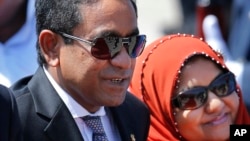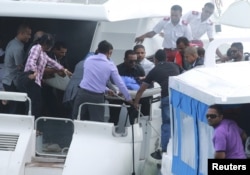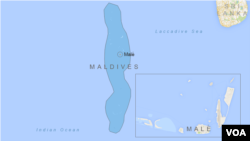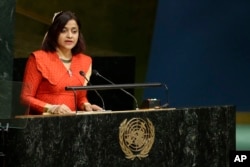There is trouble in paradise.
In the Indian Ocean island nation Maldives there are mounting concerns about what the government calls an assassination attempt against President Abdulla Yameen Abdul Gayoom.
An explosion September 28 on the presidential speedboat left the country's first lady, Fathimath Ibrahim, with spine injuries, and wounded a presidential secretary and a bodyguard.
“This is looking more like a targeted attempt on the life of the president, in which case it obviously becomes an even more serious matter, and this is an act of terrorism if you will,” Foreign Minister Dunya Maumoon told VOA on Monday.
Maumoon said it is premature to say who is responsible as the investigation continues with assistance from the U.S. Federal Bureau of Investigation and officials from other countries, including India, Sri Lanka and Saudi Arabia.
Rumors, accusations
Rumors have swirled over who was behind the blast, with many connecting it to the country's turbulent politics and some accusing the country's vice president of playing a role.
Vice President Ahmed Adheeb Abdul Ghafoor, of the ruling Progressive Party of Maldives, denies he had anything to do with the incident.
"Accusations like these circulate every time an incident of this sort happens in the country,” Adheeb said.
Some national defense force officers were arrested following the blast on suspicion of destroying evidence, according to sources quoted Monday by Sun Media in the capital, Male.
The incident has increased anxiety in a country mired by years of political instability. Things are a “little bit tense” in the Maldives Foreign Minister Maumoon acknowledged.
There are also concerns about the explosion's impact on tourism, as the Maldives' atolls are among the world's premier resort destinations.
“We rely entirely on tourism really for our livelihood. It's something that could potentially really put at risk our livelihoods and that's something that every Maldivian finds very worrying,” she said.
No presidential statement
“We have yet to hear a word from the president himself. He has not spoken to the public yet since the blast happened,” noted Eva Abdulla, a member of parliament and of the opposition Maldivian Democratic Party.
Gayoom's office issued a statement Sunday, following his meeting with India Foreign Minister Sushima Swaraj, that said the Maldives would not tolerate foreign parties interfering with domestic issues.
The comment is seen as a reference to international condemnation of the Maldives' imprisoning former President Mohamed Nasheed who was ousted in 2012 in what his party has called a coup.
Many international observers criticized the legal proceedings after charges against Nasheed for ordering a judge's arrest were cast as a terrorist abduction, which culminated in a conviction and a 13-year sentence.
A U.N. Human Rights Council's working group recently called for Nasheed's immediate release, saying he has been arbitrarily detained.
“It is not an easy time given that there's a lot of misinformation about president Nasheed's trial and imprisonment,” said Maumoon, the eldest daughter of former President Maumoon Abdul Gayoom.
Current President Abdulla Yameen Abdul Gayoom is the half brother of Maumoon Abdul Gayoom, whose 30-year rule was interrupted in 2008 by Nasheed, the maritime nation's first democratically elected leader.
Nasheed, a former journalist, was seen as pro-Western and at the forefront of the fight against Islamic extremism.
Terrorist hub
“Maldives is increasingly becoming a terrorist hub,” legislator Abdulla said. “Given that, given the political situation, given the assassination attempt on the president's life, all these factors combined, Maldives is a very dangerous place to be at the moment.”
Foreign Minister Maumoon said the government is “very concerned” about the rising number of young people in the country turning jihadists and has in place actions to prevent them from traveling abroad to and returning from Syria, Yemen and other extremism hot spots.
Some human rights activists estimate about one of every 200 people in the country are in various stages of the criminal justice system, due to political activity or perceived comments or actions against the government.
Abdulla told VOA she and other opposition lawmakers are receiving death threats daily via text message along with warnings their children will be kidnapped.
Traditional allies
Government opponents also accuse the administration of turning its back on the nation's traditional friends while warming ties with Saudi Arabia and China.
A new law allows foreigners to own land in the Maldives if they invest $1 billion and reclaim 70 percent of the land from the sea.
India and other countries have expressed concern the legislation is primarily meant to allow China to establish a military base.
“Let me categorically say that this allegation of a military base is entirely untrue. We have close relations with China as we do with many, many other countries,” Maumoon said in a telephone interview Monday with VOA.








